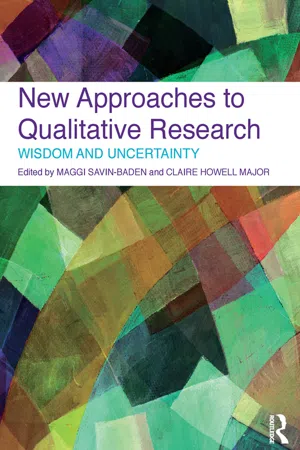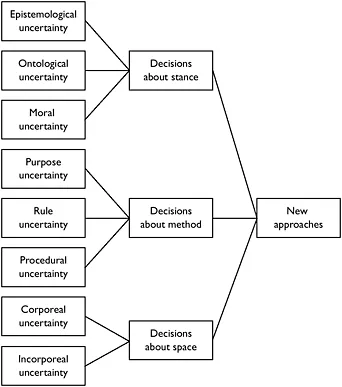Chapter 1
Introduction
The uncertainty of wisdom
Maggi Savin-Baden and Claire Howell Major
Beginning in the twentieth century, philosophers and researchers began to speak out, taking a critical view of positivistic approaches to research, which, they argued and continue to argue, were and are not serving knowledge well. The underlying assertion was that positivist approaches that sought to discover ‘truth’ had missed the mark, largely due to the non-existence of a universal ‘Truth’ that could be objectively, and with certainty, known. These arguments gathered steam, and many scholars began to consider questions about the purpose of research, ways to accomplish research, sources of data, and so forth.
Many of these post-positivists argued that the emphasis of research should be upon interpretive understanding, for example the verstehen of Weber (1949), rather than the Comtean-type positivism of observable, objectively defined phenomena. Instead they argued, for example those in the Chicago School, that truths held by individuals need to be uncovered and unpacked in order to shed light on multiple, and often competing, realities. The emergence of fieldwork methods and the evolution of the interview as a central research strategy in Chicago in the 1950s furthered methodological development in the qualitative paradigm. Dewey was perhaps one of the first to raise the issue about how our various knowledge claims are warranted, arguing that for truth claims to be taken seriously they must be supported by appropriate arguments or evidence. He maintained that there was no difference in principle in the warranting of scientific and other types of claims (Dewey, 1916).
These and attending arguments have changed the way that many researchers approach their work. The trend for those who have found validity in these claims has been towards more naturalistic, interpretive and critical inquiry, and such studies often have been published under the moniker of ‘qualitative research’. In social science and professional fields, thousands of articles resulting from the studies that these researchers have produced have been published in numerous journals. In addition, a variety of tomes describing approaches to qualitative research have been developed (for example, see Denzin and Lincoln, 2000).
Despite these important efforts to establish qualitative studies as a legitimate approach to research, however, uncertainty as to how to undertake qualitative research still seems to exist, especially as new models, approaches and conceptual frameworks emerge. Researchers still are struggling with what it means to be a qualitative researcher, what various qualitative designs entail, and how qualitative research plays out in the face of a number of environmental and cultural variables. This is perhaps epitomised in the overuse of approaches termed ‘grounded theory’, terms such as ‘fine-grained research’ and arguments that something is necessarily ethnographic, when often what is being referred to is just a few interviews. Such difficulties and struggles were the impetus for developing this text.
Guiding concepts for the book
The guiding concepts for this book are wisdom and uncertainty. These two terms in some ways seem incompatible with each other. Yet we see that they can and likely should be viewed as complementary. We make the argument through the selection of chapters that comprise this text that uncertainty is a part and parcel of wisdom. We further explore this notion prior to providing an overview of the text.
Wisdom
The concept of wisdom has received attention since the ancient Greeks sought to discover its basis. For example, in the fifth and fourth centuries BC the Sophists became the first to consider the epistemological question, ‘what is the nature and reliability of human knowledge?’ The Sceptics in this tradition believed that the human mind was incapable of taking in knowledge without distorting whatever it perceived or conceived. The metaphysical perspective peaked in this period, when the trio of Socrates, Plato and Aristotle fundamentally changed views of knowledge acquisition. Socrates, the first of these famous Greek philosophers, believed knowledge was unattainable. To prove his claim, he used dialogue and questioning approaches to probe student understanding of moral concepts such as justice, and applied formal logic to their ideas to show inconsistencies, inadequacies and weaknesses of their beliefs. He wanted students to think harder and search to discover truth within themselves. His method evolved into the current notion of the Socratic method or Socratic dialogue. This questioning and probing of assumptions and beliefs is inherent in research methodologies today, but often the whole issue of wisdom is sidestepped. Certainly, few research methods texts tackle the issue of wisdom, and perhaps our stance here is best demonstrated though the combined effort of Plato and early Christian texts. Knowledge according to Plato could not be gained through sensory perceptions alone; rather, knowledge must also involve a form of intuition. Similarly Solomon, king of Israel, when asked by God what he wanted did not ask for riches, but instead asked for wisdom – something that was later seen in action as a strongly intuitively guided decision-making process.
Wisdom in qualitative research seems to us to be not only associated with knowledge but also with virtues, as suggested by Macfarlane in Chapter 3 and Duncan and Watson in Chapter 6. The early Greeks, who perhaps were the first to consider the concept of wisdom, often associated it with a virtue. So one must have knowledge, in order to be wise, but it must be a knowledge of what is true and right. Yet wisdom, as in the case of Solomon and Job, also requires a capacity for intuition, as demonstrated by Kanuka, Major and SavinBaden, and O’Toole in Chapters 11, 12 and 13 respectively. Other scholars have extended the concept of wisdom to being able to apply knowledge into different contexts, as exhibited by Ropers-Huilman and Winters in Chapter 5, Gourlay in Chapter 9, Lorenzo in Chapter 14 and Venegas and Huerta in Chapter 16. However, whether arising from virtue, intuition, knowledge or expansion of consciousness, the concept of wisdom seems to involve a further move beyond knowledge and understanding, onto the capacity to make good decisions, as Savin-Baden and colleagues note in Chapter 17 concerning research in immersive virtual worlds. Further, many believe that wisdom can and should be sought, and that it can be taught, yet we suggest that perhaps wisdom emerges best through managing uncertainty in research.
Uncertainty
Uncertainty is a term that has been used in a variety of disciplines, from philosophy to finance to engineering. Subtle nuances appear to distinguish the term from one discipline to the next, as Cousin notes in Chapter 2. Noteworthy, however and somewhat relevant to this text, are the concepts of uncertainty in statistical research. From probability to Bayesian statistics, the notion of uncertainty is well developed in statistical fields. As one of the advocates of Bayesian statistics notes:
Interestingly, the concept of uncertainty has not yet been fully explored in qualitative research. Perhaps what is more often referred to, however, is ontological security or insecurity, which derives from the phenomenological work of the philosophers Husserl, Merleau-Ponty and Sartre. In the early part of the twentieth century, investigations by these philosophers into a sense of being in the world produced various differently expressed disjunctions, from received experience to the uncertainty of labelling, naming and dealing with that experience, which was itself related to a sense of relationship between the self and whatever counts as shared reality. Such disjunctions are seen by van Niekerk and Savin-Baden in Chapter 4, Saldana in Chapter 7, and Kuntz in Chapter 15. Questioning the sense of the relationship of self to the real world leads to ontological questioning and can result in insecurity. This ontological security or insecurity fundamentally relates to a sense of identity and stability, although such senses differ at different times in context and between different people, as Colyar and Holley suggest in their discussion of narrative inquiry in Chapter 7. As the literature suggests, some people relish and some are undermined by certain levels of insecurity of self in the world.
Wisdom and uncertainty: interrelated concepts
In understanding that both wisdom and uncertainty are states of being, we believe that one can lead to the other. There is a level of uncertainty inherent in wisdom, particularly if one accepts that a judgement or decision must result from it and that actions in turn result from those judgements or decisions. We see uncertainty unfolding in qualitative research in several ways, as Wimpenny notes in Chapter 10, leading to several key considerations that ultimately influence scholarly approach. We depict them in the taxonomy shown in Figure 1.1, which we describe more fully in the following sections that lay out the organization of the text.
Likewise, there is wisdom in accepting that not all can be known, that there are some things simply beyond human capacity for understanding.
Organization of this text
This text is designed to present positions, designs and practices that recognize the complexity of qualitative research in a late modern age. In this book, we take the approach that qualitative research is a broad field of inquiry which encompasses and even encourages difference, which is apparent even within a given design, and that such difference often is not made explicit. This book seeks to make difference and difficulty explicit while also offering suggestions and guidance for practice, developed from experience in the face of uncertainty. Contributors to this book have meddled with uncertainty and wrestled with difficulties that arise from the level of complexity in a qualitative approach. The result is that we have a body of work to celebrate and share, through both successes and failures. We present this book in three parts: Part I, Stance; Part II, Methodologies and methods; and Part III, Places and spaces.
Stance
We see stance as the way that researchers position themselves in relation to their subjects, their participants and their own belief systems, and the way in which they locate themselves across the qualitative paradigm. Throughout the text, we acknowledge the many different ways to view stance, and recognize that researchers who must acknowledge an uncertain position face many unique challenges. We present five chapters that critically depict ways in which modern researchers can engage with uncertaint...

